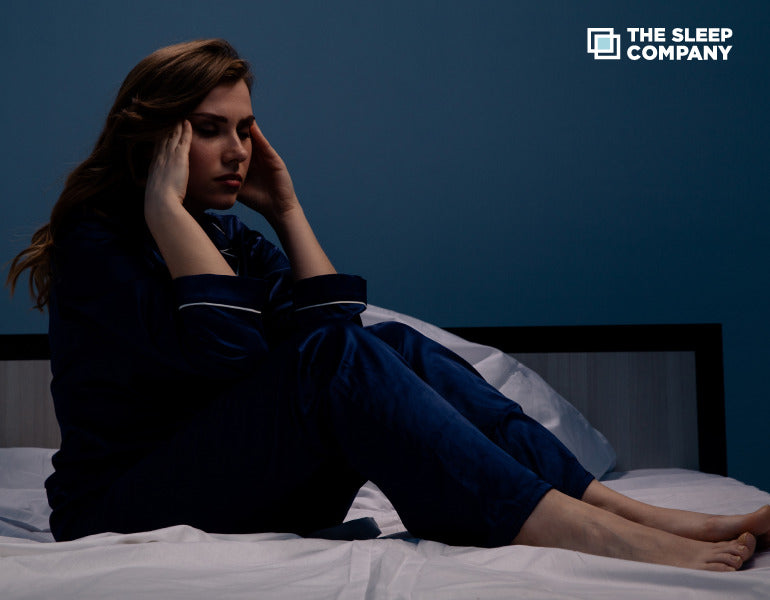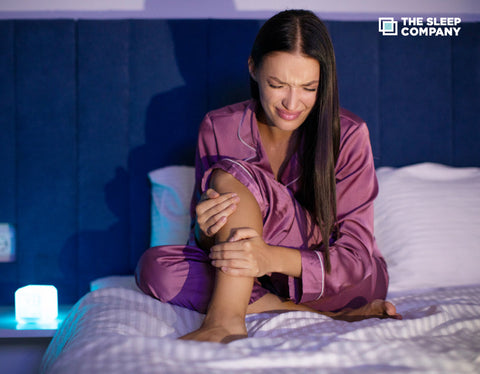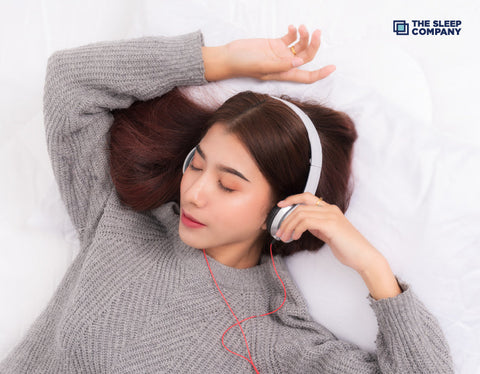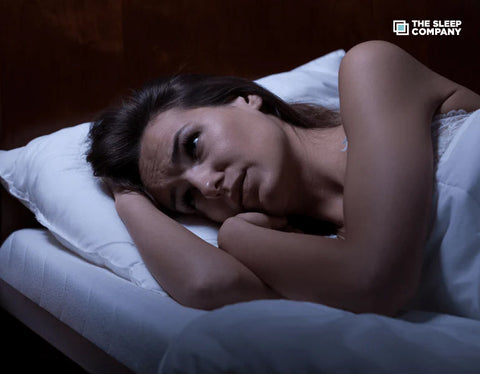My Cart

10 Quick Remedies for Sleep Disorders

Almost 78.2% of the population is struggling with symptoms of sleep disorders. Are you one of them?
In fact, short-term insomnia is one such ailment. While the amount of sleep you need can vary from one adult to another, the bottom line is at least 7 hours of uninterrupted rest. When you aren't able to achieve this goal, it leaves you dragging the next day.
And, when sleep disorders become a norm, they adversely impact your health, such as fiddling with your concentration or putting you at risk of blood pressure and heart risk.
Thankfully, there are some natural fixes you can try for a nourishing slumber. Let's unpack more ahead!
What Are Sleep Disorders?

Don't confuse sleep disorders with a day or two of uninterrupted sleep. So, what is sleep disorder?
Well, Sleep disorders are conditions that disrupt your normal sleep patterns. They affect how well you sleep, when you fall asleep and stay asleep, and how much sleep you get. Basically, they mess with your sleep quality and quantity.
And, when sleep disorders aren't tackled in time, they can lead to daytime fatigue, impact your mood, focus, and overall health. Some of the common types of sleep disorders include,
1. Insomnia:
Insomnia is a condition where you find it excessively difficult to fall or stay asleep. Poor sleep habits or anxiety/depression can lead to this condition. Have you been tossing and turning in search of sleep? Or do you wake up in the morning feeling as if you haven't slept? Here is the best mattress for insomnia.
2. Sleep apnea:
In this condition, the upper airway gets obstructed or there may be a problem with the brain's signalling to the muscles that control breathing during sleep. This causes sleep disruptions, snoring, and weariness. Here are the reasons for sleep apnea.
3. Narcolepsy:
This is a neurological disorder where you experience excessive daytime sleepiness and sudden episodes of sleep. This is caused by the deficiency in the brain chemical hypocretin.
4. Restless leg syndrome:
With restless leg syndrome, you have an uncontrollable urge to move the legs due to discomfort or aching sensations. Abnormalities in the brain chemical dopamine, genetics, or other medical conditions may be the reason.
9 Reasons Why You Could Be Having Sleep Disorders

But why does sleep disorder affect some? What are sleeping disorder reasons? Some of the most common ones include:
| Reasons For Sleep Disorder | Why Does It Cause Sleep Disorders? |
| Stress and anxiety | Mental health issues like stress, anxiety, depression, and trauma can disrupt sleep patterns. |
| Poor sleep hygiene | Irregular sleep schedules, excessive screen time before bed, and consuming caffeine or heavy meals late in the day, are a few factors that lead to sleep issues. |
| Medical conditions | Certain medical conditions such as sleep apnea or neurological disorders can cause sleep issues. |
| Medications | Some medications, including certain antidepressants or even medications for hypertension, can disrupt sleep patterns as a side effect. |
| Substance use | Alcohol, nicotine, and certain recreational drugs tend to disrupt your sleep cycle. It makes it excessively difficult to fall or stay asleep |
| Environmental factors | Noisy environments, extreme temperatures, or uncomfortable beds can hinder sleep quality. |
| Genetics | Genetic factors can influence sleep patterns and can put individuals at risk of certain sleep disorders. |
| Age | Sleep patterns naturally change with age. Sometimes, aging can be the reason why you are unable to enjoy a peaceful snooze. |
| Poor mattress | A poor mattress can cause discomfort, pain, and inadequate support, which can lead to disrupted sleep patterns. |
10 Quick Remedies You Can Try At Home To Overcome Sleep Disorders
So, how to cure a sleep disorder? The very first plan of action is to try natural sleeping problem solutions. They can do wonders. Take a look below at 10 ways how to treat sleep disorders with home remedies.

1. Enjoy A Nice Beverage
No, we are not talking about a glass of wine or alcohol here. There are a few beverages of choice known for sleep disorder treatment. Some of them are;
A. Herbal Teas
Herbal tea can be a great choice to treat sleep disorders. You can try chamomile tea an hour or two before you are supposed to hit the sheets. Chamomile is a herb that has been traditionally used for its calming properties.
Drinking chamomile tea before bed can help you relax and flush out the stress. You also have peppermint tea, which not only relaxes you but also soothes the digestive system. Also, sipping on a hot beverage has a calming quality to it.
B. Warm Milk
Warm milk is a classic, isn't it? Our mums and grandma would always make us a glass when we were young. They knew what they were doing!
Milk contains tryptophan, an amino acid that can increase the production of serotonin and melatonin, two hormones involved in regulating sleep-wake cycles. You can even make turmeric milk, which can help you relax and enhance sleep quality.
C. Tart Cherry Juice
Tart cherry juice is rich in natural melatonin, a hormone that regulates the sleep-wake cycle. So, drinking tart cherry juice in the evening can help improve sleep duration and quality.
2. Use Melatonin Supplements
Our body naturally releases melatonin to induce sleep. It takes the light exposure into account to kickstart this process. However, in this day and age, we are surrounded by electronics where unnatural light can hinder the process. And, when melatonin is not released as it should, you may struggle with falling asleep.
So, to tackle this sleep disorder, you can opt for melatonin supplements available in the market. They are an over-the-counter medicine for sleep disorders.
Now, melatonin supplements are synthetic versions of the hormone that can be taken orally. They work by increasing the levels of melatonin in the body in order to regulate the sleep-wake cycle. That said, you must opt for it only after speaking with your doctor. Taking any medication without proper advice can do more harm than good.
3. Set Ideal Temperature
The room temperature can be the key to curing sleep disorders. Being too hot or too cold will only enhance the discomfort. It is said that the ideal temperature for most people is around 60 to 67 degrees Fahrenheit (15 to 19 degrees Celsius).
Why does this work? Well, this range is said to support the body's natural temperature regulation process during sleep. So, you are able to enjoy a deeper and more restful rest. That said, you can always experiment and see what works for you!
4. Keep the Room Dark
As mentioned earlier, your circadian rhythm is influenced by light. It helps your body and mind prepare you for bed. So, at least 2-3 hours before bed, you can dim the lights.
Also, invest in blackout curtains if the light is bright outside. This can help you overcome sleep disorders and enjoy a restful sleep.
5. Mindful Meditation
A great practice that can help you fall asleep easily is mindful meditation. This helps you overcome any sleep disorders by keeping the stress away. Here are a few steps to help you get started.
- Make sure the room is dark, quiet, and comfortable, and lie down on your bed. Be as comfortable as possible.
- Now, close your eyes and take slow, deep breaths. Notice the sensation of the air entering and leaving your body.
- Here, all your focus must be on your breath work. Let all other thoughts gently drift away.
- Next, start a body scan. From your toes, gradually scan your body for any tension or discomfort. With each breath, imagine releasing tension and allowing your muscles to relax.
- If any thoughts or distractions arise, don't worry, just let them be and gently guide your attention back to your breath or body sensations.
- If you find it helpful, you can also visualize yourself in a peaceful and calming environment, such as a tranquil beach or a serene forest.
- However, remain in the present moment and focus on the sensations of relaxation and calmness in your body. Let go of everything else.
You can also try guided meditation if it helps. Do it for about 15 minutes.
6. Try Calming Activities
When stress or anxiety gets the best of you, you can always turn to calming activities before bed. They can help you shift your focus from your worries and concentrate on the now. Some of the activities you can indulge in are:
A. Taking a Warm Bath or Shower
A warm bath or shower can help relax tense muscles and create a sense of calmness before bedtime. In fact, it also regulates your body temperature, which makes it easy to fall asleep. However, do it at least an hour or two before bed.
B. Practicing Yoga or Stretching
Gentle yoga poses or stretching exercises can release tension from your body and help you relax. But make sure you don't overstimulate yourself.
C. Journaling
Write down your thoughts, feelings, or anything that's on your mind before bed. This can help clear your mind and reduce bedtime worries.
D. Aromatherapy
For some people, aromatherapy works. Use calming essential oils like lavender, chamomile, or sandalwood in a diffuser or as part of a bedtime routine to surround yourself with a sense of calmness as it can help you fall asleep.
E. Visual Imagery
Visual imagery can be great for overcoming sleep disorders and it is very simple. All you have to do is go to your happy place. Imagine yourself in a peaceful and serene place, such as a beach or a quiet forest. Visualizing calming scenes can help reduce stress and anxiety.
7. Turn Off Screens
Your mobile phones, laptops, and other electronics emit blue light that can mess with your body's internal clock.
Also, scrolling through social media or playing games on your phone can overstimulate your mind. Therefore, turn off the electronics at least an hour before bed. You can use this time to calm yourself with the activities we mentioned earlier.
8. Eat A Light Meal
Always eat a light meal before bed. This can aid sleep by preventing discomfort and indigestion. Heavy meals close to bedtime can lead to acid reflux and discomfort. This, of course, makes it harder to fall asleep.
Even if you are looking for a late-night snack, go for something that's light and balanced, such as almonds, a glass of milk, or a banana.
9. Try Relaxing Music
Go for relaxing, soft, and soothing music before you hit the sheets. You can opt for something classical here or just indulge in the calming sounds of nature and more.
Relaxing music reduces stress and distracts from disruptive noises. Its gentle rhythms and soothing melodies slow the heart rate, ease muscle tension and promote the release of sleep-inducing chemicals.
10. Read A Book
According to a 2021 study, it was seen that reading before bed improved sleep in 8-22% of individuals who participated.
You can try reading a relaxing book that doesn't overstimulate your mind or cause strong emotional responses.
When Should You Opt For Sleep Disorder Treatment?
Even after trying all the remedies for more than a week, if you don't notice any difference, it is time to seek sleep disorder treatment. You can consult a healthcare practitioner or a sleep specialist to help you out. They will evaluate your symptoms, identify any underlying causes, and recommend appropriate treatment options.
Conclusion
Now you know all about sleep disorders. Remember, if not tackled in time, sleep disorders can wreak havoc on your sleep cycle and impact various aspects of life, including mood, cognitive function, and physical health. You can try the above-mentioned quick remedies to help you out.
That said, there is one thing that goes unnoticed and can be the cause of your sleep disorders. We are talking about your mattress.
A bad mattress can cause discomfort, poor sleep posture, allergen exposure, motion disturbances, and heat retention. All this can interfere with a good night's rest unknowingly.
Therefore, if your mattress seems to be the issue, it's time to bring home the Smart Ortho Pro Mattress by The Sleep Company.
The Smart Ortho mattress brings you the patented SmartGrid technology that improves sleep quality by striking the right balance between comfort and support. Its 5-zone orthopaedic support along with 2500+ air channels offer exquisite comfort so your snooze doesn’t get disrupted.
If you are battling sleep disorders like sleep apnea, you can also opt for Elev8 Smart Recliner Bed by The Sleep Company. The adjustable mechanism means you can reduce the symptoms by elevating the upper body, which can help keep the airway open and reduce breathing interruptions during sleep.
FAQs
A few remedies you can try to fix your sleep cycle include regular exercise, maintaining sleep hygiene, and a comfortable mattress. You can also try relaxation techniques before bed to calm you down.
The best treatment for an individual differs from person to person. However, you can try the above home remedies as mentioned in the above article. You can also visit your healthcare practitioner for a personalized treatment plan to treat sleep disorders.
Some effective natural remedies for insomnia are practicing relaxation techniques, creating a proper bedtime routine, exercising regularly, and trying herbal supplements like chamomile tea. However, if nothing works, it's always best to consult a doctor.





























































